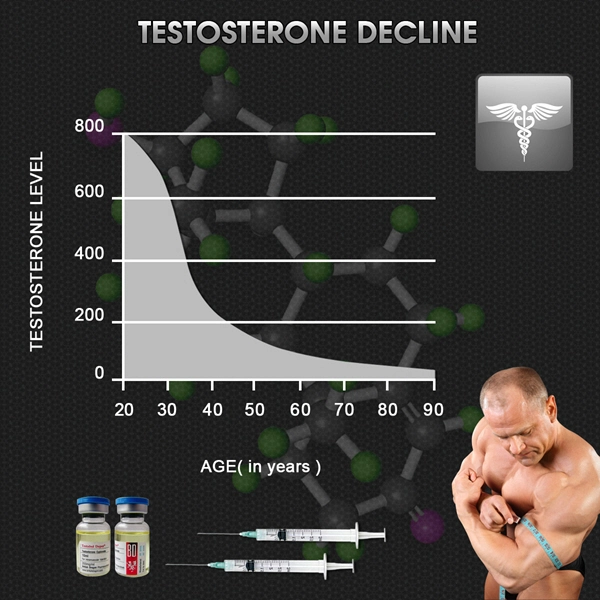Introduction
Recent research has begun to illuminate the intricate relationship between hormonal imbalances and the immune system, particularly in the context of autoimmune disorders. Testosterone, a key male hormone, has been implicated in modulating immune responses, yet its role in the prevalence and severity of autoimmune diseases remains understudied. This article delves into a recent cross-sectional study that explores the association of low testosterone levels with autoimmune disorders in American males, utilizing immunological markers to provide a deeper understanding of this complex interplay.
Study Design and Methodology
The study in question adopted a cross-sectional design to investigate the correlation between testosterone levels and autoimmune disorders. A cohort of American males aged between 25 and 65 years was selected, ensuring a diverse representation across different ethnic backgrounds and geographic locations. Participants underwent comprehensive blood tests to measure serum testosterone levels, alongside a battery of immunological markers such as anti-nuclear antibodies (ANA), rheumatoid factor (RF), and C-reactive protein (CRP). Self-reported medical histories and clinical assessments were also utilized to confirm diagnoses of autoimmune disorders.
Key Findings on Testosterone Levels and Autoimmune Disorders
The results of the study revealed a significant association between low testosterone levels and an increased prevalence of autoimmune disorders among American males. Specifically, participants with testosterone levels below the normal range exhibited a higher incidence of conditions such as rheumatoid arthritis, systemic lupus erythematosus, and type 1 diabetes. The data suggested that for every 10% decrease in testosterone levels, there was a corresponding 5% increase in the likelihood of developing an autoimmune disorder.
Immunological Markers and Their Implications
Further analysis of the immunological markers provided additional insights into the mechanisms underlying this association. Elevated levels of ANA and RF were observed in participants with low testosterone, indicating a heightened autoimmune activity. Moreover, CRP levels, which are indicative of inflammation, were also higher in this group, suggesting that low testosterone may contribute to increased inflammatory responses that exacerbate autoimmune conditions.
Clinical Relevance and Potential Interventions
The findings of this study have significant clinical implications for the management of autoimmune disorders in American males. Physicians may consider routine screening for testosterone levels in patients presenting with symptoms suggestive of autoimmune diseases. Furthermore, the potential role of testosterone replacement therapy (TRT) in mitigating the severity of autoimmune conditions warrants further investigation. While TRT is not currently a standard treatment for autoimmune disorders, the study's results suggest it could be a promising avenue for future research and clinical trials.
Limitations and Future Research Directions
Despite its insightful findings, the study is not without limitations. The cross-sectional nature of the research precludes the establishment of causality between low testosterone and autoimmune disorders. Additionally, the study's reliance on self-reported data may introduce biases. Future longitudinal studies are needed to confirm these associations and to explore the long-term effects of testosterone levels on autoimmune disease progression. Moreover, investigating the genetic and environmental factors that may interact with testosterone levels to influence autoimmune susceptibility could provide a more comprehensive understanding of this phenomenon.
Conclusion
This cross-sectional study has shed light on the significant association between low testosterone levels and the prevalence of autoimmune disorders in American males. By incorporating immunological markers, the research provides a nuanced view of how hormonal imbalances may contribute to the development and severity of these conditions. As the medical community continues to unravel the complex interplay between hormones and the immune system, these findings underscore the importance of considering hormonal factors in the diagnosis and management of autoimmune diseases. Future research and clinical trials will be crucial in translating these insights into effective therapeutic strategies for affected individuals.

- Environmental Toxins Linked to Declining Testosterone Levels in American Men [Last Updated On: March 4th, 2025] [Originally Added On: March 4th, 2025]
- Economic Burden of Low Testosterone on American Healthcare System [Last Updated On: March 17th, 2025] [Originally Added On: March 17th, 2025]
- Vitamin D's Role in Managing Low Testosterone in American Men: Insights and Strategies [Last Updated On: March 17th, 2025] [Originally Added On: March 17th, 2025]
- Low Testosterone in American Males: Symptoms, Causes, and Management Strategies [Last Updated On: March 18th, 2025] [Originally Added On: March 18th, 2025]
- Low Testosterone and Mood Disorders in American Men: Causes, Symptoms, and Treatments [Last Updated On: March 18th, 2025] [Originally Added On: March 18th, 2025]
- Chronic Illnesses and Their Impact on Testosterone Levels in American Males [Last Updated On: March 18th, 2025] [Originally Added On: March 18th, 2025]
- Low Testosterone's Impact on Muscle Health in American Males: Causes, Effects, and Treatments [Last Updated On: March 19th, 2025] [Originally Added On: March 19th, 2025]
- Low Testosterone in American Men: Symptoms, Diagnosis, and Treatment Options [Last Updated On: March 19th, 2025] [Originally Added On: March 19th, 2025]
- Alcohol Consumption's Impact on Testosterone Levels in American Men [Last Updated On: March 20th, 2025] [Originally Added On: March 20th, 2025]
- Low Testosterone and Diabetes in American Males: Impacts and Management Strategies [Last Updated On: March 20th, 2025] [Originally Added On: March 20th, 2025]
- Low Testosterone in Aging Men: Symptoms, Impacts, and Management Strategies [Last Updated On: March 21st, 2025] [Originally Added On: March 21st, 2025]
- Low Testosterone's Impact on Cognitive Function in American Men: Memory, Attention, and Executive Skills [Last Updated On: March 21st, 2025] [Originally Added On: March 21st, 2025]
- Smoking's Impact on Testosterone: A Critical Health Concern for American Men [Last Updated On: March 21st, 2025] [Originally Added On: March 21st, 2025]
- Low Testosterone's Impact on Skin Health in American Men: Causes and Management [Last Updated On: March 21st, 2025] [Originally Added On: March 21st, 2025]
- Shift Work's Impact on Testosterone Levels in American Men: Risks and Mitigation Strategies [Last Updated On: March 22nd, 2025] [Originally Added On: March 22nd, 2025]
- Zinc's Role in Boosting Testosterone Levels in American Men: A Comprehensive Overview [Last Updated On: March 23rd, 2025] [Originally Added On: March 23rd, 2025]
- Low Testosterone and Depression in American Males: Links, Implications, and Therapy [Last Updated On: March 23rd, 2025] [Originally Added On: March 23rd, 2025]
- Low Testosterone and Hair Loss: Impact and Management in American Males [Last Updated On: March 23rd, 2025] [Originally Added On: March 23rd, 2025]
- Boosting Testosterone in American Men Through Tailored Physical Activity [Last Updated On: March 23rd, 2025] [Originally Added On: March 23rd, 2025]
- Medications Impacting Testosterone Levels: Insights for American Men's Hormonal Health [Last Updated On: March 23rd, 2025] [Originally Added On: March 23rd, 2025]
- Weight Loss: A Key Strategy for Boosting Testosterone in American Males [Last Updated On: March 23rd, 2025] [Originally Added On: March 23rd, 2025]
- Herbal Supplements: A Natural Approach to Treating Low Testosterone in American Men [Last Updated On: March 23rd, 2025] [Originally Added On: March 23rd, 2025]
- Low Testosterone Linked to Osteoporosis Risk in American Men: Prevention and Treatment Insights [Last Updated On: March 24th, 2025] [Originally Added On: March 24th, 2025]
- Low Testosterone in American Males: Impact on Libido and Treatment Options [Last Updated On: March 24th, 2025] [Originally Added On: March 24th, 2025]
- Dietary Strategies to Boost Testosterone in American Men: Key Nutrients and Foods [Last Updated On: March 24th, 2025] [Originally Added On: March 24th, 2025]
- Genetic Factors in Low Testosterone Among American Males: Research and Implications [Last Updated On: March 24th, 2025] [Originally Added On: March 24th, 2025]
- Nutritional Deficiencies and Testosterone: Insights for American Males [Last Updated On: March 24th, 2025] [Originally Added On: March 24th, 2025]
- Low Testosterone and Prostate Health: Understanding Risks and Management Strategies [Last Updated On: March 24th, 2025] [Originally Added On: March 24th, 2025]
- Environmental Estrogens: Impact on Testosterone Levels in American Males [Last Updated On: March 25th, 2025] [Originally Added On: March 25th, 2025]
- Low Testosterone and Metabolic Syndrome: Impacts and Interventions in American Men [Last Updated On: March 25th, 2025] [Originally Added On: March 25th, 2025]
- Low Testosterone: Symptoms, Diagnosis, and Impact on Men's Quality of Life [Last Updated On: March 25th, 2025] [Originally Added On: March 25th, 2025]
- Low Testosterone: Impacts and Strategies for Managing Body Composition in American Males [Last Updated On: March 25th, 2025] [Originally Added On: March 25th, 2025]
- Low Testosterone and Anemia: Exploring the Link and Treatment in American Men [Last Updated On: March 25th, 2025] [Originally Added On: March 25th, 2025]
- Low Testosterone's Impact on Emotional Health in American Men: Insights and Solutions [Last Updated On: March 25th, 2025] [Originally Added On: March 25th, 2025]
- Chronic Inflammation's Impact on Testosterone Levels in American Males [Last Updated On: March 26th, 2025] [Originally Added On: March 26th, 2025]
- Chronic Stress Impact on Testosterone Levels in American Men: Management Strategies [Last Updated On: March 26th, 2025] [Originally Added On: March 26th, 2025]
- Low Testosterone's Impact on Immune Function in American Males: Insights and Interventions [Last Updated On: March 26th, 2025] [Originally Added On: March 26th, 2025]
- Low Testosterone and Thyroid Disorders: Exploring the Link in American Men [Last Updated On: March 26th, 2025] [Originally Added On: March 26th, 2025]
- Liver Health's Crucial Role in Managing Testosterone Levels in American Males [Last Updated On: March 27th, 2025] [Originally Added On: March 27th, 2025]
- Low Testosterone Linked to Insulin Resistance in American Men: Impacts and Strategies [Last Updated On: March 27th, 2025] [Originally Added On: March 27th, 2025]
- Low Testosterone Linked to Increased Heart Disease Risk in American Men [Last Updated On: March 27th, 2025] [Originally Added On: March 27th, 2025]
- Low Testosterone and Skin Health: Impacts and Management in American Men [Last Updated On: March 27th, 2025] [Originally Added On: March 27th, 2025]
- Hormonal Imbalance and Low Testosterone in American Males: Causes, Symptoms, and Treatments [Last Updated On: March 27th, 2025] [Originally Added On: March 27th, 2025]
- Sleep Apnea's Impact on Testosterone Levels in American Males: Causes and Solutions [Last Updated On: March 27th, 2025] [Originally Added On: March 27th, 2025]
- Chronic Pain's Impact on Testosterone Levels in American Males: A Comprehensive Analysis [Last Updated On: March 28th, 2025] [Originally Added On: March 28th, 2025]
- Managing Low Testosterone in Aging Men: Symptoms, Diagnosis, and Treatment Options [Last Updated On: March 28th, 2025] [Originally Added On: March 28th, 2025]
- Dental Health Impacts Testosterone Levels in American Males: Insights and Recommendations [Last Updated On: March 28th, 2025] [Originally Added On: March 28th, 2025]
- Low Testosterone Linked to Higher Autoimmune Disease Risk in American Men [Last Updated On: March 28th, 2025] [Originally Added On: March 28th, 2025]
- Low Testosterone Linked to Neurological Risks in American Men: Implications and Interventions [Last Updated On: March 28th, 2025] [Originally Added On: March 28th, 2025]
- Respiratory Health's Impact on Testosterone Levels in American Males: COPD and Asthma Effects [Last Updated On: March 29th, 2025] [Originally Added On: March 29th, 2025]
- Low Testosterone Linked to Increased Kidney Disease Risk in American Men [Last Updated On: March 30th, 2025] [Originally Added On: March 30th, 2025]
- Gut Health and Testosterone: A Vital Connection for American Men's Wellness [Last Updated On: March 30th, 2025] [Originally Added On: March 30th, 2025]
- Low Testosterone's Impact on Musculoskeletal Health in American Men: Risks and Interventions [Last Updated On: April 1st, 2025] [Originally Added On: April 1st, 2025]
- ENT Health's Crucial Role in Optimizing Testosterone Levels in American Males [Last Updated On: April 1st, 2025] [Originally Added On: April 1st, 2025]
- Low Testosterone Linked to Increased Eye Disorder Risk in American Men [Last Updated On: April 2nd, 2025] [Originally Added On: April 2nd, 2025]
- Reproductive Health's Impact on Testosterone Levels in American Men [Last Updated On: April 4th, 2025] [Originally Added On: April 4th, 2025]
- Low Testosterone and Hematological Risks in American Men: Insights and Management [Last Updated On: April 7th, 2025] [Originally Added On: April 7th, 2025]
- Understanding Low Testosterone: Causes, Diagnosis, and Management Strategies [Last Updated On: April 7th, 2025] [Originally Added On: April 7th, 2025]
- Low Testosterone's Impact on Urological Health in American Men: Risks and Management [Last Updated On: April 7th, 2025] [Originally Added On: April 7th, 2025]
- Low Testosterone Levels Linked to Higher Infection Risk in American Men [Last Updated On: April 8th, 2025] [Originally Added On: April 8th, 2025]
- Low Testosterone Linked to Psychiatric Disorders in American Men: Implications and Management [Last Updated On: April 9th, 2025] [Originally Added On: April 9th, 2025]
- Immune System's Role in Low Testosterone Among American Males: A Holistic View [Last Updated On: April 10th, 2025] [Originally Added On: April 10th, 2025]
- Managing Rheumatological Health to Address Low Testosterone in American Males [Last Updated On: April 10th, 2025] [Originally Added On: April 10th, 2025]
- Cancer's Impact on Testosterone Levels in American Men: Causes, Effects, and Management [Last Updated On: April 10th, 2025] [Originally Added On: April 10th, 2025]
- Testosterone Levels and Wound Healing in American Males: Impacts and Implications [Last Updated On: April 12th, 2025] [Originally Added On: April 12th, 2025]
- Trauma's Impact on Testosterone Levels in American Males: Physiological and Psychological Insights [Last Updated On: April 13th, 2025] [Originally Added On: April 13th, 2025]
- Low Testosterone's Impact on Surgical Outcomes in American Men: Risks and Recommendations [Last Updated On: April 13th, 2025] [Originally Added On: April 13th, 2025]
- Low Testosterone and Vascular Health: Impacts and Management in American Men [Last Updated On: April 13th, 2025] [Originally Added On: April 13th, 2025]
- Managing Low Testosterone: The Crucial Role of Anesthetic Health in American Males [Last Updated On: April 15th, 2025] [Originally Added On: April 15th, 2025]
- Low Testosterone Linked to Increased Allergic Reactions in American Men: Health Implications [Last Updated On: April 15th, 2025] [Originally Added On: April 15th, 2025]
- Neonatal Health's Impact on Adult Testosterone Levels in American Males [Last Updated On: April 16th, 2025] [Originally Added On: April 16th, 2025]
- Low Testosterone in Men Linked to Increased Pediatric Disorder Risk in Offspring [Last Updated On: April 17th, 2025] [Originally Added On: April 17th, 2025]
- Low Testosterone in American Men Linked to Congenital Disorders: Implications and Management [Last Updated On: April 18th, 2025] [Originally Added On: April 18th, 2025]
- Prenatal Health's Impact on Testosterone Levels in American Males [Last Updated On: April 19th, 2025] [Originally Added On: April 19th, 2025]
- Low Testosterone and Genetic Disorders: Risks and Implications for American Men [Last Updated On: April 19th, 2025] [Originally Added On: April 19th, 2025]
- Testosterone's Role in Male Health: Development, Genetics, and Lifestyle Impacts [Last Updated On: April 19th, 2025] [Originally Added On: April 19th, 2025]
- Occupational Health's Impact on Testosterone Levels in American Males [Last Updated On: April 20th, 2025] [Originally Added On: April 20th, 2025]
- Low Testosterone's Impact on Geriatric Health in American Men: Detection and Management [Last Updated On: April 20th, 2025] [Originally Added On: April 20th, 2025]
- Understanding Low Testosterone: Symptoms, Impacts, and Treatment Options for Men's Health [Last Updated On: April 21st, 2025] [Originally Added On: April 21st, 2025]
- Low Testosterone Linked to Cognitive Decline in Aging American Men: Study Insights [Last Updated On: April 22nd, 2025] [Originally Added On: April 22nd, 2025]



List of USA state clinics - click a flag below for blood testing clinics.
Word Count: 591


















































